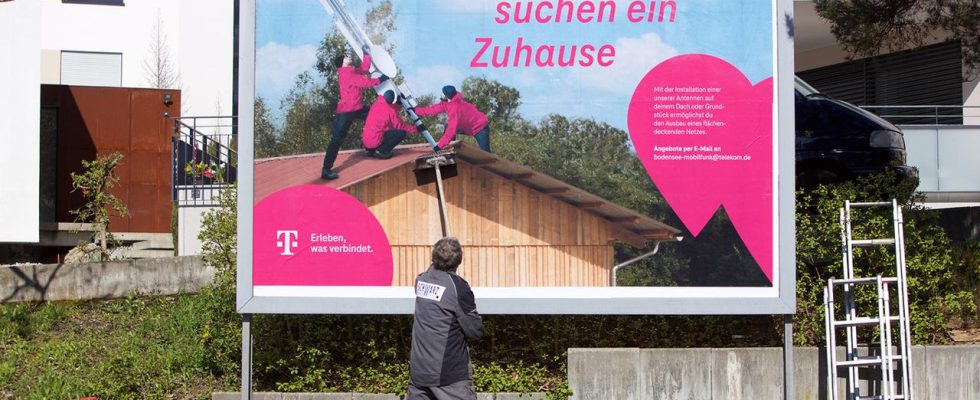background
In Überlingen on Lake Constance, Telekom is desperately looking for locations for modern 5G cellphone masts. But the reservation in the place is great. The case is an example of the sluggish grid expansion in Germany.
“Our antennas are looking for a home”: With this slogan in the brand-typical magenta, Deutsche Telekom is looking for potential locations for its mobile phone antennas on large billboards all over Überlingen, the second-largest city in the Baden-Württemberg Lake Constance district.
The reason: Telekom would like to expand the network for the new, fast 5G mobile communications standard – but there is a lack of suitable space for the radio masts. That’s a problem that the company keeps having all over Germany, says Telekom spokesman Markus Jodl.
At full capacity, the network reaches its limits
In principle, the 5G network in Überlingen is not bad at all, says Jodl. Only some sub-places are not yet fully covered. The much bigger problem, however, is the network capacity. “The use of mobile phone networks is increasing by around 30 percent per year.”
Streaming, messenger services, video calls – these are all data-intensive applications. Even where the network coverage is good at first glance, the capacities are often no longer sufficient. “You don’t even need top speed, but as many people as possible must be able to use the network at the same time,” says Jodl.
In other words, more antennas are needed. But in Überlingen, the company has not yet received any suitable locations for rent from either the city or private individuals.
reservations against cellular antennas still big
Deutsche Telekom has been commissioned by the Federal Network Agency to ensure the supply. You have to find the locations where you set up your masts yourself – and also take on this task for the other cell phone operators.
But in many places one fails due to resistance. “It’s often the case that we still encounter a lot of reservations in the communities,” says Jodl. The expansion of mobile phone networks in the 2000s was viewed much more critically.
“We discussed health aspects much more often or whether mobile communications were needed at all.” In Jodl’s opinion, things have improved, but many are still skeptical – not only in the country, but also in the cities.
Location offers of the city unsuitable for Telekom
Take Überlingen as an example: Telekom tried to get in touch with the city early on – that’s the normal process, says the company spokesman. Telekom finds places where it thinks the mobile network needs to be improved, so-called search circles. The first thing to do is to contact the municipalities. In Überlingen, however, they received little support, criticizes Jodl.
City spokeswoman Andrea Winkler sees it differently and points out that urban plots of land have been proposed that the city of Überlingen believes are suitable. “However, these are not always in the search circles or are not accepted by Telekom in specific cases,” says Winkler.
A Germany-wide problem, says Telekom. Many communities lack the understanding that mobile phone providers do not need just any location, but also ones that fit into the network.
“A location can’t be somewhere in the forest. Rabbits and hedgehogs don’t make calls, people do,” says Telekom spokesman Jodl. That’s why Telekom is now looking for private owners in Überlingen who will rent their space to them – for 15 years.
Others too mobile operator know the problems
The problem with the radio mast locations is also known to the other mobile operators. Vodafone reports that it is often extremely difficult to find a suitable replacement location, especially when old locations are no longer available.
Telefónica, umbrella group of O2, criticizes not only the willingness of municipalities and private individuals to rent, but also the often lengthy planning and approval processes. “Bureaucratic hurdles in setting up new locations and expensive frequency auctions are hampering the expansion of mobile communications,” says Board Member Valentina Daiber tagesschau.de.
In their opinion, one solution could be so-called “approval fictions”: An approval is considered granted if the process has not been processed by the end of a period.
Federal Network Agency keeps a low profile
The Federal Network Agency is staying out of the dispute. When asked by tagesschau.de. Only they could answer questions about it.
According to the Federal Network Agency, 5G coverage by at least one network operator has increased to around 79 percent of the federal territory in recent months.
In Telekom’s opinion, it could be more if there weren’t so many reservations about the antennas in Germany. After all: There were several offers from private property owners for the poster campaign in Überlingen. Two of them are now being examined more intensively.

